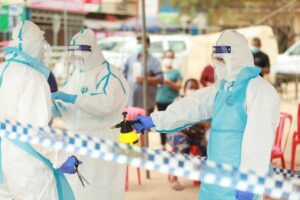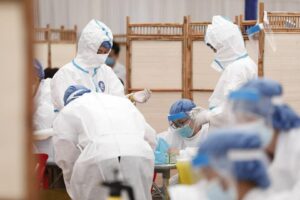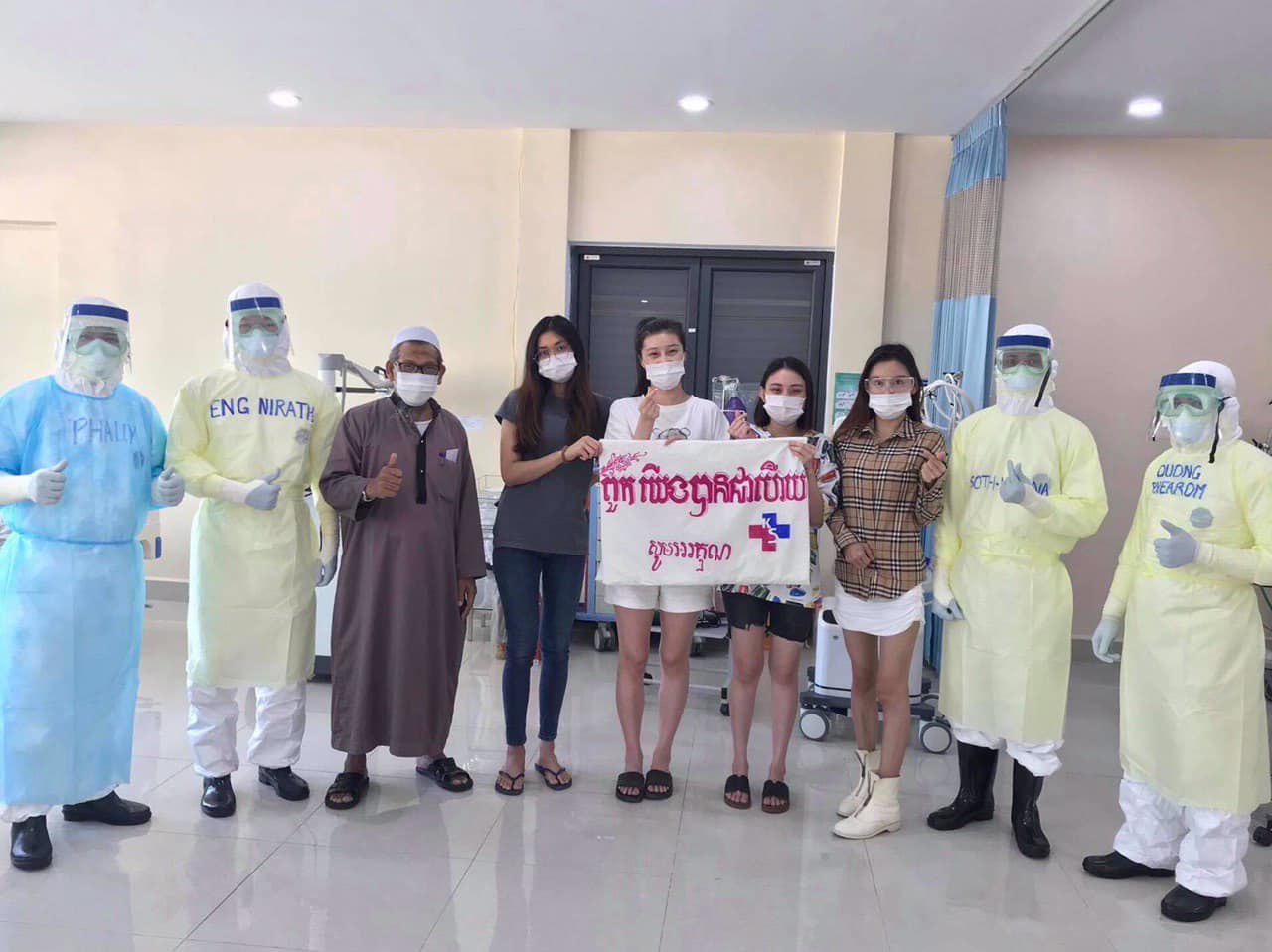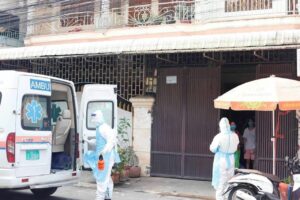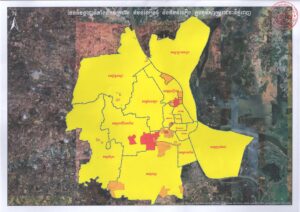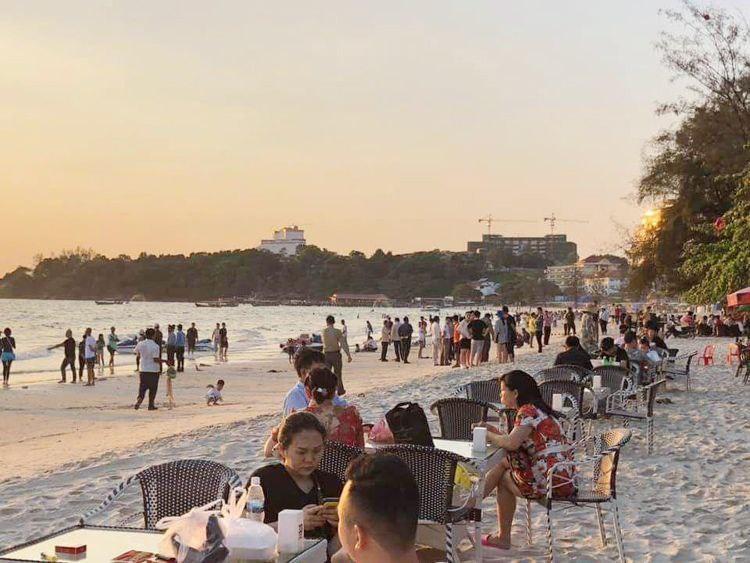WHO Urges More Effective Interventions And Calls For Greater Community Participation To Suppress COVID-19 Transmission In Cambodia
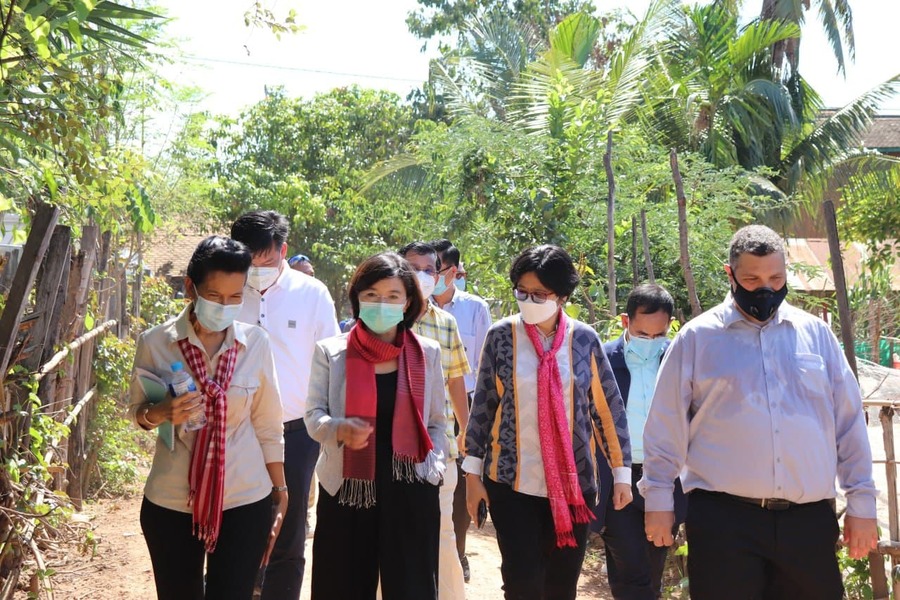 Dr. Li Ailan (2nd L, Front), WHO Representative to Cambodia, joins H.E. Dr. Or Vandine (2nd R, Front), Secretary of State for Health, and representatives of GIZ and Racha during a recent field-visit to Kampong Thom province on June 1,2021. (Photo: MoH)
Dr. Li Ailan (2nd L, Front), WHO Representative to Cambodia, joins H.E. Dr. Or Vandine (2nd R, Front), Secretary of State for Health, and representatives of GIZ and Racha during a recent field-visit to Kampong Thom province on June 1,2021. (Photo: MoH)
Dr. Li Ailan, WHO Representative to Cambodia, has urged more effective interventions and called for greater community participation to suppress COVID-19 transmission in Cambodia.
The following is her full statement released yesterday:
Cambodia is at a pivotal moment in our fight against COVID-19. Our collective actions and wider community participation today determine what will happen tomorrow — “rising case and death numbers,” or “falling case numbers, saving lives and a return to the new normal.” “We must do everything we can, to prevent the spread of the virus and devastating health, social and economic effects,” said Dr Li Ailan, WHO Representative to Cambodia, “It is crucial to find more effective ways to ensure implementation of and compliance with good public health and social measures, especially through wider community participation.” WHO has been advising and recommending the whole-of-government and the whole-society-approach for pandemic preparedness and response. With such an approach, Cambodia made its remarkable achievements in managing the COVID-19 pandemic in 2020, with only a small number of cases and zero death.
The pandemic is far from over. Unfortunately, the virus is now circulating in many parts of Cambodia. As of June 13, 2021, a total of 38,427 cases including 335 deaths have been reported to WHO. “While the government has been working tirelessly and around the clock, to stop the spread of the virus, save lives and protect health”, said Dr. Li Ailan, “recent findings of a COVID-19 perception and behavioural insight survey” conducted by WHO in May 2021 identified pandemic fatigue and low risk perception among communities in Cambodia. These findings have me concerned. I fully understand that people are getting tired after the 18-month fight against the virus, but we have no other choice. We must step up our efforts to stop the spread of COVID-19. Everyone has a vital role to play.”
Our common goal is to suppress the virus’s transmission and prevent large-scale community transmission, which has immeasurable health and socio-economic impacts. To do so, we need to refocus on the effectiveness of interventions by fully implementing and complying with public health and social measures.
If the virus spreads widely throughout our communities, large-scale restrictions and lockdown could be required, which would affect all areas of life—businesses, religious activities and jobs. Widespread transmission throughout our communities would overwhelm hospitals and health facilities, which would mean that people with COVID-19 and with other health conditions would not be able to receive the care they need.
There are many effective ways to reduce everyone’s risk. Business owners and managers especially have a role and responsibility in protecting Cambodians. The need to open establishments again and provide jobs and services to the community are very real, but it must be done in ways that reduce risk. So, maximise the use of outdoor spaces and well-ventilated areas. Minimise the number of people in enclosed settings at any time. Wear masks correctly. Wash hands frequently. Keep physical distance wherever possible. Hold meetings online, and not in person.
The responsibility to protect our communities also lies with every Cambodian and resident of Cambodia. Go to the market only when it is necessary. Try to go during off-peak hours. Do errands outside busy hours. If you eat at restaurants or meet people, sit outside and not in closed, air-conditioned spaces and maintain physical distance. Eat with only a few people whom you see regularly instead of having large gatherings. Stay at least 1.5 metres apart from other people at work, at the pagoda, workplace, and wherever else possible. We should avoid confined settings where the virus is known to spread easily, such as nightclubs, casinos and other entertainment venues.
It has been observed that most people are aware of what to do and where to seek trusted information in case of illness. So, in case of feeling sick, stay home and do not travel. If you are sick, and especially if you have a fever, cough, or trouble breathing, it is important to seek medical advice before the condition worsens. Early diagnosis and early treatment save lives and prevent virus spread.
Sometimes it may feel as if much is being asked of us. “I understand why many of us are keen to go out. People need income. We all want fresh air, walk around, eat and drink outside, meet friends. But we have to be very careful about COVID-19, and new infections are occurring every day,” said Dr. Li Ailan.
WHO encourages the government and partners to reinforce strategic evidence-based risk communication and community engagement interventions using multi-channel, and multi-platform approach to reach out, engage and empower the communities, especially women, youths and community leaders and health workers.
Only by working together and by recognising and embracing the complexity of our shared human experiences and capacities, we can ensure that the “New Normal” world will be one that leaves no one behind. Right now, it is crucial for all of us to focus on and contribute to more effective interventions including through greater community and society engagement:
- Proactively reducing any 3C setting, avoiding gathering and unnecessary travel. Most COVID-19 cases have been occurring in the 3C setting like factories, crowded living places, markets, prisons and entertainment venues. The virus is spreading from one place to another place through people movement and travel.
- Promoting the “new normal.” A lifting of movement restrictions, relaxing some interventions, reopening business does not mean a return to the old normal. We should make our wise decision to choose the “new normal,” especially ensuring health and the economy go hand in hand. Putting risk mitigation measures in place in the business sector and workplaces is a “co-benefit” approach and represents the best choice to ensure both lives and livelihood.
- Championing individual choices and being a good citizen of compliance. The 3 Dos and 3 Don’ts as advised by RCG are the effective measures and tools to end the pandemic, if implemented effectively. By doing so, you protect yourself, families and communities.
- Getting vaccinated when it is your turn. Do not miss this live-saving opportunity. COVID-19 vaccines are a very powerful tool to prevent severe diseases, reduce hospitalisation and save lives. WHO strongly recommends prioritising health care workers, the elderly, people with chronic conditions and other high risk groups when the vaccine supplies are limited at the initial stage. However, the vaccines alone will not end the pandemic, and we must continue to implement other public health and social measures effectively.
AKP

